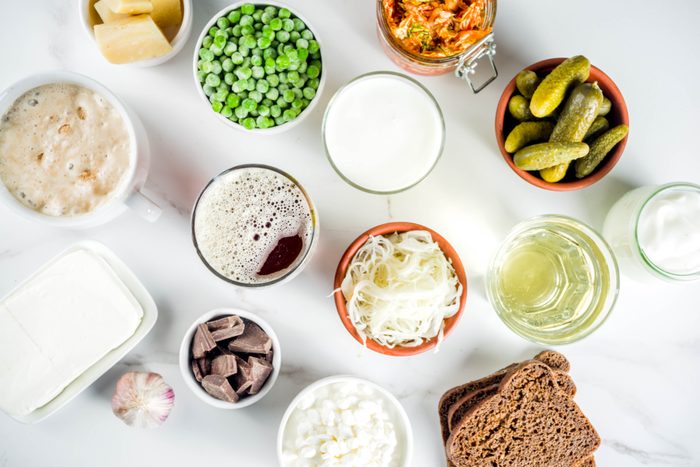What You Need to Know About the Mind-Gut Connection

Could improving your gut health with probiotics and a balanced diet really boost your mental wellbeing?
“Go with your gut”—turns out that phrase is more than just an idiom. Perhaps you’ve felt “butterflies in your stomach” when you were anxious. Or maybe, you had a “gut feeling” when your fight-or-flight response was activated during a stressful moment. Now, studies show that there’s a key connection between your gut and brain, and that improving your gut health and diet might be an important part of improving your mental health.
“Many illnesses initially thought to be brain-based like depression, anxiety, even things like dementia, for example, actually may not be solely and may not even be majorly brain-based,” says Dr. Valerie Taylor, the head of the department of psychiatry at the University of Calgary and a scientist the Hotchkiss Brain Institute. “It might actually be the gut that really is controlling a lot of these things through the many connections between your GI system and your brain.”
This is what you need to know about the mind-gut connection.
(Related: 8 Women Share the Impact the Pandemic Has Had on Their Mental Health)
What is the mind-gut connection?
While the focus on gut health as a means to improve mental health has been trending lately, the idea itself isn’t new. In the early 20th century, George Porter Phillips noticed that patients in London’s Bethlem Royal Hospital who suffered from melancholia usually also suffered from constipation. This led Philips to experiment with feeding patients kefir, which is chock full of gut-friendly bacteria to ease digestion and, he hoped, depression. It worked, and now over a century later, the basic premise behind improving gut health and mental health is taking off and has become a huge interest of study.
“Our gut has more recently been referred to as our ‘second brain.’ We have seen the gut and the microbes within it play a role in our immune response, body inflammation, amino acid metabolism and making brain chemicals,” says Kelly Matheson, a registered dietitian working at a mental health hospital in Ontario. “Because what we eat ends up in our gut, researchers want to look at whether the composition of our diet impacts the processes and communication with our brain.”
So far, studies have been early, but promising. According to Matheson, some of the strongest evidence we have for the link between nutrition and mental health is around improving symptoms of depression and dementia. “However, it is important to note that nutrition at this time is still considered complementary, and not a replacement to traditional treatments such as medication or therapy.”
(Related: 38 Habits to Start Today to Keep Your Brain Healthy at 80)
How can your diet influence your mental health?
There are lots of ways that our gastrointestinal (GI) system and brains are linked. For example, neurotransmitters (the chemicals in your brain responsible for mood, like serotonin which is thought to be deficient in people with depression and anxiety) are sometimes produced in the gut. “Many of the antidepressants currently on the market work by increasing the serotonin levels in our brains,” says Taylor. “But we also now know that a lot of the bacteria in our GI system actually produces serotonin themselves or are involved in serotonin metabolism, breaking it down for our bodies.”
Another major way that the GI system and brain are connected is the vagus nerve, the longest nerve in the body which runs directly from your gut to your brain. When the vagus nerve is stimulated (either with certain exercises, nutrients or probiotics), you feel calmer and happier.
What’s this I hear about probiotics?
Probiotics, which are often found in yogurt and other fermented foods, are made up of good bacteria that helps keep your gut healthy. “The gut impacts the brain, and the brain subsequently impacts your gut,” says Taylor. “I think if you’re feeling well and you want to prolong that wellness, things like probiotics can absolutely be linked to gut health and hopefully preventing an exacerbation of something like depression and anxiety.”
(Related: How to Build a Strong Microbiome to Improve Your Gut Health)
What sorts of foods should you eat to improve your gut health and mental health?
Of course, fermented foods that have tons of probiotic benefits are go-tos for improving gut and mental health. Matheson lists foods like yogurt, kefir, kimchi, sauerkraut and fermented tea drinks like kombucha as great sources of probiotics.
Fibre is another great way to improve gut and mental health. Since fibre can’t be digested in the small intestine, it moves on to the large intestine intact, where microbes break it down into short-chain fatty acids, which are absorbed and travel to the brain. “If you produce lots of short-chain fatty acids, the hypothesis is that your brain is going to be healthier,” says Taylor. High-fibre foods include fruits and veggies, and whole grains.
Omega-3 fats are also recommended for a healthy gut and mind. Omega-3s are essential fats that can be found in a number of foods like fatty fish, eggs, flaxseeds and chia seeds. “Omega-3 fats have anti-inflammatory properties and newer animal models show the role of omega-3s in improving the intestinal walls and assisting with immunity,” says Matheson.
(Related: 6 Most Surprising Healthy Brain Foods)
So, will drinking kombucha cure my anxiety?
Both Taylor and Matheson want people to know that while improving gut health is an excellent way to help improve your mental health, it’s not going to fix everything. “There are no probiotics that are going to help make you well without other treatments like medication or counselling,” says Taylor.
“Nutrition is one piece of the wellness puzzle when it comes to our mental health,” says Matheson. “A nutrient-dense diet with foods known to assist in mental health and can have wonderful benefits in combination with other interventions.”
Now that you know about the mind-gut connection, this is what doctors think of brain-boosting supplements.




